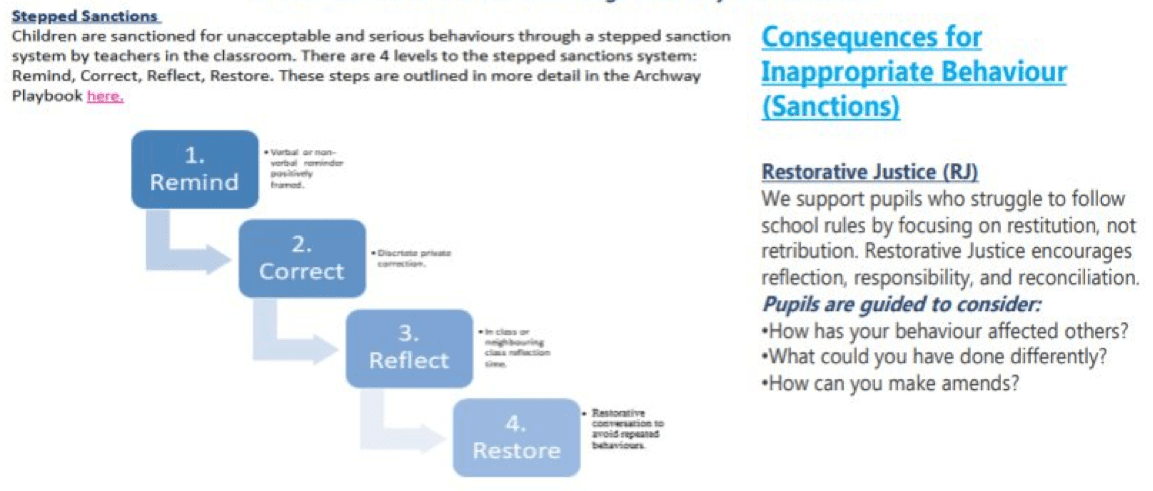All children are a gift from God. They are all special and should be allowed to develop and grow in a nurturing environment secure in knowledge that they are cherished.
Our Approach to Behaviour at Bluecoat Primary Academy
At Bluecoat Primary Academy, our approach to behaviour is rooted in consistency, compassion, and clarity. We understand that behaviour is a form of communication, and we are committed to supporting every child in developing the skills they need to regulate, reflect, and thrive.
Our procedures for rewarding positive behaviour and applying consequences for negative behaviour are designed to be open, fair, graduated, and developmentally appropriate. From Foundation Stage to Year 6, we apply a progressive and differentiated approach, ensuring that expectations and responses are tailored to each child’s age, stage, and individual needs.
We recognise that children may face challenges that impact their behaviour, and we are committed to responding with empathy and support. All staff are expected to implement our agreed policies consistently and with a trauma-informed mindset, understanding that every behaviour has a context and every child deserves to be heard.
We work closely with parents and carers to build strong partnerships that encourage positive choices and shared responsibility. We expect all families to support our behaviour policy and work collaboratively with us to help children succeed
Pastoral Pathways
To support our children holistically, we have developed three key pastoral pathways:
- Behaviour Pathway
- Mental Health Pathway
- SEND Pathway
Each pathway is structured around our Pastoral Pyramid Model, which includes four tiers of support:
Universal, Universal Plus, Targeted, and Specialist.
These pathways ensure that children receive the right support at the right time, whether they are struggling with behaviour, emotional wellbeing, or learning needs.
Sanctions and Consequences
Sanctions, when used appropriately, are a vital tool to guide children toward positive behaviour. They help clarify expectations, teach accountability, encourage reflection, and promote a safe and positive learning environment.
Before issuing formal sanctions, staff are expected to use the full range of strategies outlined in our behaviour framework, including those in Technique 6: The Art of the Consequence.
The purpose of a formal sanction is to:
- Clarify expectations
- Teach accountability
- Encourage reflection
- Promote a positive learning environment
- Support children in learning to regulate
- Reinforce positive behaviour
Reasonable adjustments must be made for children with additional needs when issuing warnings and sanctions.
Behaviour Categories
We categorise negative behaviours as either:
- Unacceptable Behaviour
- Serious Behaviour
All negative behaviours are logged on Arbor.
Unacceptable Behaviours
These are disruptive behaviours that result in a reflection in a partner classroom.
Examples include:
- Refusal to follow instructions
- Disrespect towards others or property
- Unsafe behaviour (e.g., running indoors, throwing objects, climbing furniture)
Serious Behaviours
These cause significant disruption or harm and may involve SLT and lead to more serious consequences such as isolation, suspension, or exclusion.
Examples include:
- Absconding
- Persistent undesirable behaviours
- Damage to property
- Offensive or discriminatory language
- Aggressive behaviour (verbal or physical)
- Dangerous or risk-taking behaviour
- Theft
- Child-on-child abuse (verbal, physical, bullying, online)
These behaviours are linked to DfE suspension codes to ensure compliance with national guidance.
Stepped Sanctions System
We use a four-step graduated approach to managing behaviour:
- Remind – Clarify expectations
- Correct – Address behaviour calmly
- Reflect – Time out or reflection
- Restore – Rebuild relationships and learning
Consequences are age-appropriate:
- Unacceptable Behaviour: Reflection in a partner class
- EYFS/KS1: Age of the child in minutes
- KS2: 30 minutes
- Serious Behaviour:
- SLT Lunch Reflection (20 minutes)
- SLT Reflection – Full Day (with SLT agreement)
- Offsite direction, suspension, or permanent exclusion (in extreme cases)

